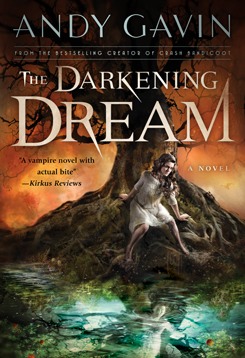 I started a new read through and edit on my first novel, The Darkening Dream yesterday. I’m waiting for feedback on my newer book and wanted to cleanup the first one so I’ll have it ready to be proofread for possible self-publishing. This is the first time I’ve looked at it in eight months (I’ve been working on Untimed) and the difference in voice is flogging my brain.
I started a new read through and edit on my first novel, The Darkening Dream yesterday. I’m waiting for feedback on my newer book and wanted to cleanup the first one so I’ll have it ready to be proofread for possible self-publishing. This is the first time I’ve looked at it in eight months (I’ve been working on Untimed) and the difference in voice is flogging my brain.
It’s weird and not a little disturbing to read your “older” work. I started TDD in January 2008, writing the first draft of what’s now the opening twenty percent (before heavy alterations). I stopped (because of work and the birth of my son) and picked up in fall of 2009. Although I’ve done about a zillion (more like ten) drafts, traces of this oldest style remain in these early sections. And boy has my literary voice changed since then. Most dramatically, I no longer detail out as much of the action and setting. Nowadays, I concentrate on sketching and implying important points, choosing my scenes less to block through the whole action than to paint in important moments. These old sections have been heavily trimmed down, edited and reworked, but they are still organized in a stodgier more sequential fashion.
And the beginning of my story is tricky, introducing a period world with a large cast of period characters. I’ve several times restructured the start of TDD, including one late attempt this year to write a number of alternate starts. But I have never found a way to replace the measured build up I currently have with a more hook driven start like Untimed has. It’s easier to start that way. Oh well, live and learn.
The biggest shocker, however, is how difficult it is getting used to past tense again. TDD is written in the normal third person past limited, where different chapters focus on different characters. There is no omniscient narrator but the implied narrator shifts from chapter to chapter. Untimed is first person present. Single narrator obviously. I’ve really grown to love the immediate quality of the present tense. One also gets to ditch most the “hads” used to indicate the past perfect. In past tense, you might say, “He went to the store,” or to indicate prior time “Earlier, he had gone to the store.” In present you’d likewise use “He goes to the store” and “He went to the store.” The normal past tense takes over for the past perfect, and it’s a much cleaner tense.
The first mini-scene of TDD is as follows:
As services drew to an end, Sarah peered around the curtain separating the men from the women. Mama shot her a look, but she had to be sure she could reach the door without Papa seeing her. After what he’d done, she couldn’t face him right now. There he was, head bobbing in the sea of skullcaps and beards. She’d be long gone before he extracted himself.
“Mama,” she whispered, “can you handle supper if I go to Anne’s?” Probably last night’s dinner debacle had been Mama’s idea, but they’d never seen eye to eye on the subject. Papa, on the other hand, was supposed to be on her side.
Mama’s shoulders stiffened, but she nodded.
The end of the afternoon service signaled Sarah’s chance. She squeezed her mother’s hand, gathered her heavy skirts, and fled.
As an experiment, I rewrote this in present tense, a fairly straightforward change:
As services draw to an end, Sarah peers around the curtain separating the men from the women. Mama shoots her a look, but she has to be sure she can reach the door without Papa seeing her. After what he did, she can’t face him right now. There he is, head bobbing in the sea of skullcaps and beards. She’ll be long gone before he extracts himself.
“Mama,” she whispers, “can you handle supper if I go to Anne’s?” Probably last night’s dinner debacle was Mama’s idea, but they never saw eye to eye on the subject. Papa, on the other hand, is supposed to be on her side.
Mama’s shoulders stiffen, but she nods.
The end of the afternoon service signals Sarah’s chance. She squeezes her mother’s hand, gathers her heavy skirts, and flees.
Which do you guys like? I suspect that past tense is more appropriate to this story, being conventional and also given the setting in 1913. But I’ve grown so fond of the present tense that I can’t judge anymore.



